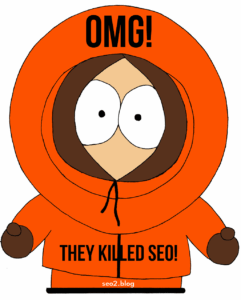
When your website address is mostly consisting of gibberish you have a problem!
You are not alone though! Do you know what the websites of the
- New York Times
- Google Maps
have in common? Their Internet addresses aka URLs suck/ed! How? See below!
Why look at website addresses at all?
Right from the start my list of the fatal URL design mistakes has been very successful.
Yet I wanted to show people how wide-spread the issue is and made this list of examples from popular sites.
By 2025 you might argue that everybody is googling website names anyway instead of typing addresses.
Yet it is important to point out how messed up URLs – these most important guiding units on the Internet – still are in some cases.
Why? Sometimes people still look at those, want to copy and paste or share them. That’s when they fail!
Both the people and the addresses fail:
- sharing becomes almost impossible
- they break in the process
- and end up leading nowhere or on an error page.
Yes, you will often end up on broken or error pages.
Just try to cut off some of the redundant gibberish from the addresses below (as often happens inadvertently) and the link won’t work properly anymore.
The annoying 404 “not found” error is the most common issue.
Thus I will feature popular sites here still using completely inappropriate Internet addresses, directory and other URL structures.
Many of those have been fixed in the meantime. The original post has been published in 2008 after all.
So I also remove some examples. Yet I also add new shocking ones.
You’ll still be surprised to see some of the biggest names and how obnoxious their url design failures are!
So, yes, even the best of us are making mistakes! Let’s learn from them! These are the actual examples:
The New York Times confuses with multiple gibberish stuffed URL parameters!
The New York Times is the most renowned US newspaper only rivaled by The Washington Post.
Yet for many years it added too many often bizarre parameters to its address!
These also changed randomly. This example is so horrible it has be on top of the list!
http://www.nytimes.com/2008/06/27/technology/27google.html?_r=3&adxnnl=1&oref=slogin&ref=business&adxnnlx=1214553738-5Jvl01JfMCKLx5duMGRv9g&oref=slogin&oref=slogin
Also try:
http://www.nytimes.com/2008/06/27/technology/27google.html?_r=3&adxnnl=1&oref=slogin&new-york-times-urls-suck
http://www.nytimes.com/2008/06/27/technology/27google.html?_r=3&adxnnl=1&oref=slogin
http://www.nytimes.com/2008/06/27/technology/27google.html
The New York Times failed again on a smaller scale.
It used only one very broad and thus boring keyword in article addresses:
http://www.nytimes.com/2008/06/27/technology/27google.html
When you’re eager to know what Google did on this date check out the article!
In fact you can find such “intriguing” URLs for almost any date.
Yet the NYT was not the only news publication struggling with URL design.
I decided to keep another classic example. It comes next.
Bloomberg is killing you softly with IDs!
Bloomberg.com is a well known and established news outlet.
Yet it is also killing you softly with so called session Ids (+ multiple random URLs for each page #5).
Example: http://www.bloomberg.com/apps/news?pid=20601087&sid=aH5xJRoWZFOU&refer=home
Also try
http://www.bloomberg.com/apps/news?pid=20601087&sid=aH5xJRoWZFOU&refer=spam
http://www.bloomberg.com/apps/news?pid=20601087&sid=aHhgZh8jHAs02
http://www.bloomberg.com/apps/news?pid=20601087
Luckily they fixed their address and directory structure by now.
Sadly they forgot to move or redirect the existing links.
Thus the examples above still “work” in the sense that they show up on the website without being fixed.
Facebook is drowning you in unintelligible parameter crap
I signed up for Facebook back in 2008. I haven’t used it for many years.
Many years later – I think it was around 2015 I finally started using it – due to my work as a social media specialist.
Also my elderly but curious mother was using it so I had to keep up haha! Hi mom!
By then Facebook was the leading social media outlet so I couldn’t keep on ignoring it for ethical reasons.
In recent years I started using it due to features like groups, Messenger and events.
So, yes, Facebook sucks due to fake news etc. yet it’s helpful due to other features.
When sharing a link from Facebook you will encounter huge issues though.
Just look at an event link from someone in the Ecstatic Dance Berlin community:
https://www.facebook.com/events/407794889059171/?acontext=%7B%22event_action_history%22%3A[%7B%22mechanism%22%3A%22attachment%22%2C%22surface%22%3A%22newsfeed%22%7D]%2C%22ref_notif_type%22%3Anull%7D&__cft__[0]=AZW2FcvdrJoQ3zTqSrS6fwihUKOVJxylHRVg_231wWZKVCFWNiBjyRI8F5a7cfxS7qbM3o0VmGqlmXSIO6Rnhp0BlBuM6DZiP2NA1QYC2dfb_xm9s05GgD0hz5WPmGfCF4al6xOL5FI-fCLZ9ejkhWFi3lxr0MoQOL9p01PKtTCebUq4aGeoaW0llmGi4_BYbWs&__tn__=H-R)
Everything after the question mark including itself is just internal info.
The actual link works perfectly without it. This is it:
https://www.facebook.com/events/407794889059171/
Yet the added crap makes it almost impossible to share it.
I have struggled with the same issue numerous times already.
Google Maps adds humongous tail of random numbers to its URLs
You’d think that the Google Maps team – which deals with real life addresses and works for Google – would be aware of the importance of readable Internet addresses.
Yet it’s not the case. Whenever I try to share an address from Google Maps I struggle with it.
Just look at this URL of one of the most important tourist attractions in Berlin:
https://www.google.com/maps/place/Brandenburg+Gate/@52.5162746,13.3756442,18z/data=!3m1!5s0x47a851c6f6399a69:0xcda158542550640e!4m10!1m2!2m1!1sbrandenburger+tor!3m6!1s0x47a851c655f20989:0x26bbfb4e84674c63!8m2!3d52.5162746!4d13.3777041!15sChFicmFuZGVuYnVyZ2VyIHRvcloTIhFicmFuZGVuYnVyZ2VyIHRvcpIBDWhpc3RvcmljX3NpdGXgAQA!16zL20vMDE0a2Y4?entry=ttu&g_ep=EgoyMDI1MDIwNC4wIKXMDSoASAFQAw%3D%3D
What happens when you cut it off starting with the “data” part? It will still show the right place:
https://www.google.com/maps/place/Brandenburg+Gate/@52.5162746,13.3756442,18z/
Yet the description will be gone. So you just see the map but not what you are meant to be looking for.
I even got banned on an app when I added an short link instead to share a Google Maps address.
Why? The original address from Google Maps I shared broke after the first special characters.
Their security system assumed it was some type of scam it seems.
Do we really need to fix website addresses in 2025?
You see the Web is still full of broken URLs when even some of the largest sites use them!
There must be a lot of work done before this mess is cleaned up.
In 2008 we still faced even huge sites which got the most fundamental findability and SEO best practices wrong.
By 2025 some of the issues still persist despite this post and many year of user experience improvements.
Also due to less focus on user experience some huge sites fail again in recent years!
The Facebook and Google Maps examples are from 2025! Believe it or not! Just check them out.
These URL failures prove the point. Contact the teams responsible and make them aware of these issues.
They can save millions of dollars by removing those. Why?
Millions of users are unable to share their links!








